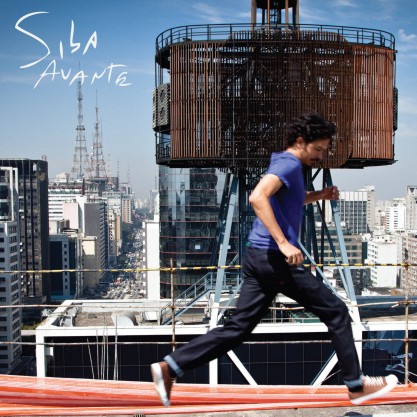Siba opens his new album Avante (available from Mais Um Discos) with a playful sounding track called “Preparando o salto” (Prepare to jump). Though upbeat in tone, the song’s lyrics tell a different story. Não vejo nada que não tenha deabado (I can’t see anything that hasn’t crumbled) are the first lines. Like the opener, the rest of Avante contains many contradictions-- musically adventurous, Siba (who plays guitar, viola and sings on the album) takes influence from sources as diverse as Congolese guitar music and ciranda (the traditional dance music of the beaches in the north of the Brazilian state of Pernamubuco). His lyrics are poetic and, at times, romantic meditations that touch on subjects like death and hopelessness. However, Siba is also an imaginative dreamer, interested in the shifting of identity that has defined his career and that forms a part of Brazilian culture through traditions like the Carnival, which he sings about on “A Bagaceira.”
Born in Recife in 1969 as Sérgio Roberto Veloso de Oliveira, Siba came from a family of musicians and poets and often heard his father, uncles and cousins singing the traditional improvised rhyming poetry known as coco. Siba began his career as a leader of the Recife-based manguebeat movement of the ‘90s. His band, Mestre Ambrósio was one of the most prominent groups of the roughly defined genre, which melded traditional Northeastern Brazilian music with Western and world popular music. After Mestre Ambrósio broke up, Siba retreated to the Brazilian interior of Zona da mata where he played ciranda and marcatu, an Afro-indigenous Brazilian genre often associated with Carnival celebrations. He went on to form the folk orchestra, Siba e a Fuloresta, in which he played the rabeca (fiddle).
Siba did not end his musical transformation in the Zona da mata. As he writes in the liner notes for Avante, “Don’t see yourself when you look in the mirror? Break it. When putting the pieces back together again, embrace the freedom of turning in to whoever you want.” Returning to Recife at the same time as he separated from his wife (a subject which may inform the tortured lyrics on many of the album's songs), Siba began work on Avante, once again developing a new sound with rock guitarist Fernando Catatau, who produced the album.
Siba left behind the rabeca for the electric guitar on Avante and assembled a group of musicians, including Léo Gervázio on tuba, Samuca Fraga on drums, and Antônio Loureira on vibraphone and keyboards to accompany him. Among the highlights on the album are “A bagaceira,” a laidback yet danceable song about the Carnival, in which Siba sings, Não quero fantasia/Vou me vestir como der/Num dia eu melo a cara/No outro eu vou de mulher (I don’t want fantasy/I’ll dress up as I can/One day I dirty my face/Another I’ll be a girl).
He continues with the theme of fantasy and reinvention on the title track, which translates to "Forward" in English. “Avante” is a fast-paced song that matches the album cover, depicting Siba running along the roof of a building in a city full of construction and activity. Both song and cover could belong to a chase scene from a gritty yet poetic crime film. Siba sings, Da mesma forma que o bafo/Precede o ronco da fera/Ou como a noite é parida/Da gravidez da cratera/A voz se esparrama aonde/Que até então não coubera (Just as the hot breath/Precedes the beast’s roar/Or how the night is born/From a crater’s pregnancy/The voice spreads to/Where it had never reached before).
He closes the album with “Bravura e Brilho” (Bravery and Light), a song about “my little son’s first years of life, with a little fantasy.” With this song, Siba finally transitions from the devastating personal torment of the album’s opening to the realm of pure fantasy, full of Naves de raios destruidores/Dragões gigantes devoradores/Lobos de sopros arrasdores/Ciclopes de olhos assustadores (Ships with destroying rays/Devouring giant dragons/Wolves with devastating blows/Cyclops with frightening eyes). Musically, Avante is playful throughout, with the well-timed interaction between guitar, vibraphone, and tuba holding constant from “Preparando O Salto” to “Bravura E Brilho.” By the end, the lyrics match the music, and that seems like a promising sign for the next step in Siba’s transformation as an artist.









